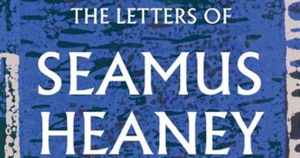Irish literature
Stephen Regan reviews ‘The Letters of Seamus Heaney’ edited by Christopher Reid
‘Australia has been a great experience,’ declares Seamus Heaney in a letter to Tom Paulin from Launceston, Tasmania, in October 1994. As well as visiting Melbourne, Brisbane, and Sydney, delivering poetry readings along the way, Heaney gave a lecture in Hobart on Oscar Wilde and The Ballad of Reading Gaol, ‘saying it was as much part of the protest literature of the Irish diaspora as “The Wild Colonial Boy” or the ballad of “Van Diemen’s Land”’. What he most enjoyed in Queensland was a drive through the country – ‘red earth and white-barked gum trees’ – to the town of Nambour, close to where his Uncle Charlie (his father’s twin brother) had lived in the 1920s. Heaney’s letters are a vivid interweaving of travelogue, literary allusion, poetic imagery, and personal history. Sharing pleasure in the power of words is fundamental, even when letter writing becomes a thing of duty, rather than beauty, and the unanswered mail piles up around him.
... (read more)The death of Gabrielle Carey earlier this year was a cruel loss for the Australian literary world, especially its Joyce community. I first met Gabrielle shortly after moving to Sydney from London in 2010. She invited me to her annual Bloomsday celebration, which took place in a Glebe pub. I was new in town and delighted to join the readings and revelry. I suspected, rightly, that my Dublin accent would glean me some credibility, if nothing else did.
... (read more)In this week’s ABR podcast, listen to Ronan McDonald discuss one hundred years of James Joyce’s Ulysses, among the most famous books of the twentieth century.
... (read more)Chris Wallace-Crabbe reviews 'An Anthology Of Modern Irish Poetry' edited by Wes Davis
For W.B. Yeats, Ireland was the place and source of poetry, even when he was living in Oxford or London. It was also a mythical figure, enabling of ardour and of song, the desirable ‘Cathleen, the daughter of Houlihan’; and it became a delicately evocative crepuscule, mocked by Brendan Kennelly when he opens a poem with ‘Now in the Celtic twilight decrepit whores / Prowl warily along the Grand Canal’. The very phrase ‘Irish poetry’ sounds like a pleonasm. For that moist country has long seemed synonymous with verse and folksong: just as Holland is synonymous with painting and France with elegant thought. Further, when I think of contemporary poets in our widespread language, Seamus Heaney must surely be the dominant world figure and Paul Muldoon the most verbally dazzling, even if our Les is close to Paul in this caper.
... (read more)



